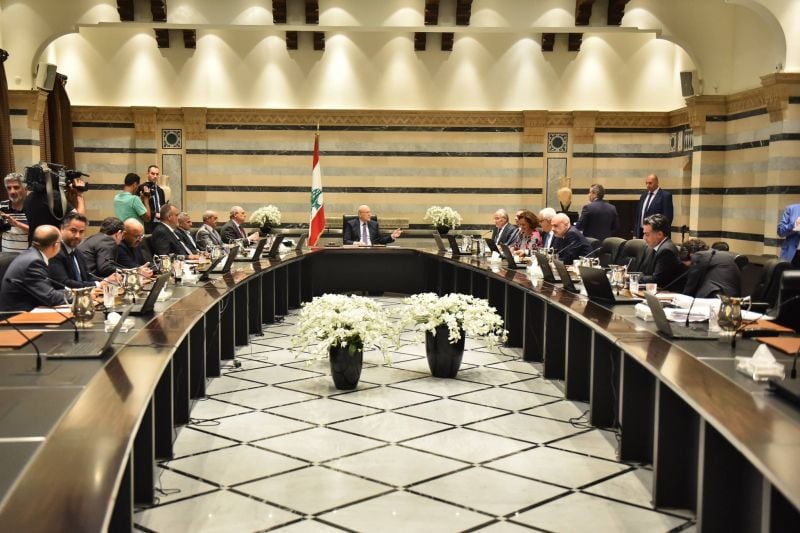
Cabinet, headed by caretaker Prime Minister Najib Mikati (C), meets at the Grand Serail, Aug. 17, 2023. (Credit: Mohammad Yassin/L'Orient Today)
BEIRUT — Cabinet has approved "dollar incentives" for public school teachers and allotted an initial payment of LL5 trillion "to ensure the start of the school year," caretaker Education Minister Abbas Halabi announced Thursday.
The total amount of incentives needed for teachers this coming academic year is $150 million. The first payment of LL5 trillion — amounting to roughly $50 million at the parallel market exchange rate — should be enough to cover "three to four months," according to the minister. Halabi hinted that the teachers will not be able to go to schools without these incentives.
Halabi's statement followed a Cabinet meeting on Thursday that mainly discussed the challenges of the educational sector in Lebanon.
Less than a month ago, Halabi warned that it would be impossible to open public schools in Lebanon next year unless dollar aid was secured to support teachers.In early 2023, public school teachers went on strike for several weeks to demand improved working conditions, as Lebanon continues its economic collapse, hampering pupils' access to continuous education.
Mikati's statement
Before the start of the meeting, Caretaker Prime Minister Najib Mikati commented on the parliamentary session that was planned in the morning but failed to happen due to a lack of quorum.
"Some [MPs] say that they do not attend the Parliament's sessions except for necessary legislation, while I believe that there is an utmost necessity at the present time to discuss all proposals and draft laws related to the economic recovery plan, the restructuring of banks, the financial gap and capital control [law]."
Lebanese MPs, notably those belonging to Christian parties, continue to boycott any parliamentary session devoted to legislation in the absence of a president. They point to the Lebanese Constitution, which mandates that Parliament act solely as an electoral college until a new president is elected.
Thursday morning's session was supposed to cover the capital control law, among other items.
Mikati noted that Lebanon is relying on the cash economy, which increases the risk of financial crimes.
He added "Parliament does not convene and Cabinet is subject to campaigns, at a time when the country has reached a very difficult and dangerous stage. The responsibility does not only lie with the government and we are doing much more than [what a caretaker government is supposed to do] because we care about the survival of the country and the continuation of its institutions."
Finally, Mikati said that "there is hope related to the approach of oil exploration in the south, and next week we will visit the [drilling] platform."
Caretaker Public Works Minister Ali Hamieh announced on Wednesday that the TransOcean Barents drilling rig, which will begin gas exploration in Lebanon's offshore Block 9, has "arrived at the drilling point."
Meanwhile, caretaker Information Minister Ziad Makari announced after the Cabinet meeting that the ministers also approved "a memorandum on the agreements signed between the Lebanese government and the Office of the United Nations High Commissioner for Refugees (UNHCR) concerning the transmission of personal data relating to Syrians displaced in Lebanon."